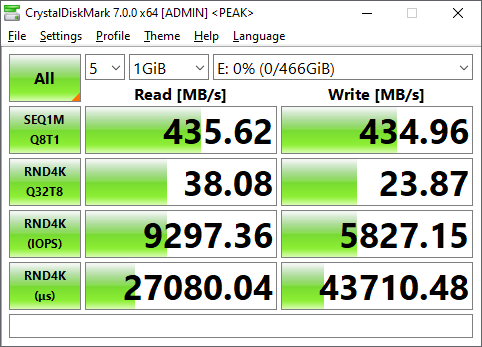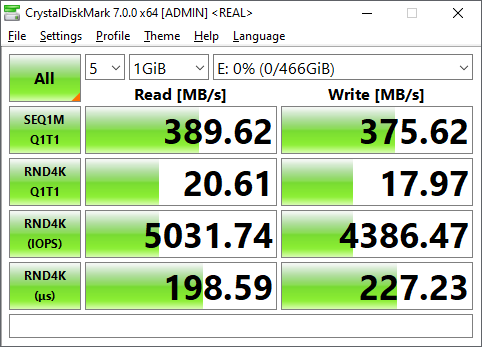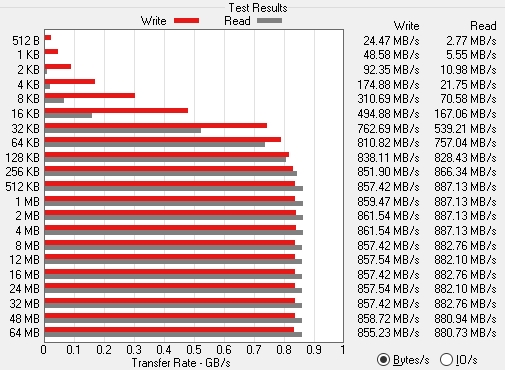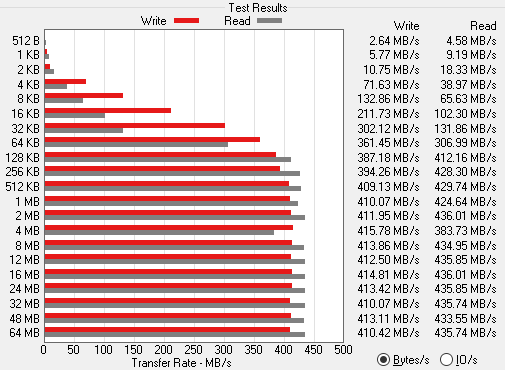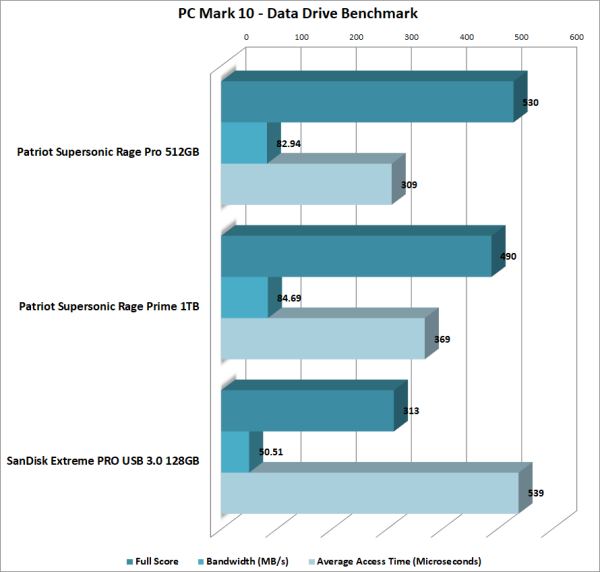Perf and Final Thoughts
Performance:
The test system used in this review is equipped with an Intel Core i7-6700K CPU, GIGABYTE GA-Z170X-UD3 motherboard, 32GB (16GB x 2) of Crucial Ballistix Sport LT DDR4 memory, Samsung 960 PRO 512GB SSD, GIGABYTE GeForce GTX 1060 and a WINDFORCE OC 6G graphics card. For the operating system, I used the latest version of Windows 10 Pro.
To test the performance of the Patriot's Supersonic Rage Prime USB 3.2 Gen 2 flash drive, I ran a series of benchmarks using CrystalDiskMark, HD Tach RW and ATTO Disk Benchmark. To get a feel for the "real world" performance, I also copied and pasted 1GB of random files and directories as well as a single 4GB ISO file in Windows Explorer.

As I mentioned earlier, the Supersonic Rage Prime is based on Phison's PS2251-17 controller chip. Looking at the screenshot above, you can see that there is a considerable performance difference when reading and writing incompressible (0%) and compressible (100%) data.
CrystalDiskMark 8.0.1:
First, I ran a few quick tests using CrystalDiskMark. This benchmark tool measures the performance of a storage device by testing its sequential read and write speeds as well as its random read and write speeds using blocks 512K and 4K in size.
According to Patriot, the Supersonic Rage Prime is capable of reading at speeds up to 600 MB/s. Looking at the screenshot above, you can see that the drive had no problem reaching its rated read speed. The Supersonic Rage Prime also did quite well in CrystalDiskMark's random write tests, reaching 85,839 IOPS.
As you'd expect, the Supersonic Rage Prime wasn't as fast when tested with the "real world" profile which uses a single thread and a much lower queue depth. Nevertheless, it was still able to read at 413.78 MB/s and write at 548.63 MB/s.
HD Tach RW 3.0.4.0:
Next, I used HD Tach to test the Supersonic Rage Prime's read, write and burst speeds as well as its seek times and CPU usage.
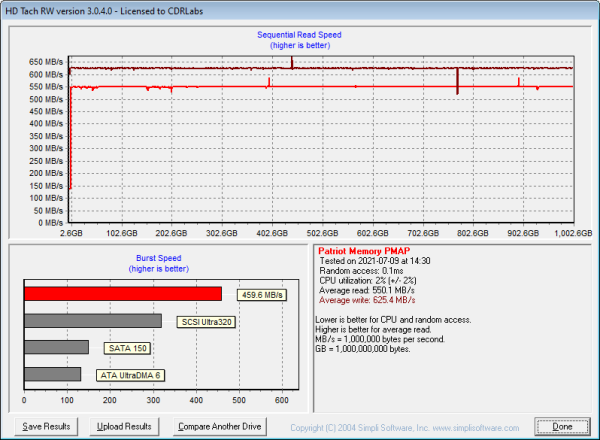
The performance here was very similar to what we saw with CrystalDiskMark. When connected to the computer's USB 3.2 Gen 2 port, the Supersonic Rage Prime had average read and write speeds of 625.4 MB/s and 550.1 MB/s, respectively, as well as a burst speed of 459.6 MB/s.
ATTO Disk Benchmark 4.01:
I also used ATTO Disk Benchmark to test the Supersonic Rage Prime's sequential read and write speeds. The tests are run using blocks ranging in size from 512B to 64 MB and the total length set to 256MB.
When tested with ATTO, the Supersonic Rage Prime's read speeds topped out at about 887 MB/s and its write speeds at 861 MB/s.
PCMark 10 - Data Drive Benchmark:
PCMark 10's Data Drive Benchmark is designed to test drives that are used for storing files rather than applications. You can also use this test with NAS drives, USB sticks, memory cards, and other external storage devices. This benchmark produces an overall score as a measure of drive performance. Comparing devices is as simple as comparing scores. The tests also measure and report the bandwidth and average access time for the drive.
Thanks to its high bandwidth, the Supersonic Rage Prime did quite well in PCMark 10's Full System Drive Benchmark. Surprisingly, this wasn't enough to top Patriot's Supersonic Rage Pro flash drive.
"Real World" Benchmark:
To test the "real world" performance of the Supersonic Rage Prime, I copied and pasted 1GB worth of randomly generated files and directories. All of the files are between 1KB and 95MB in size and no more than five directories deep. To see how well the drive handled large files, I also copied and pasted a 4GB ISO file.
| Patriot Supersonic Rage Prime | Patriot Supersonic Rage Pro | |
| 1GB Files - Write: | 3 seconds | 9 seconds |
| 1GB Files - Read: | 4 seconds | 6 seconds |
| 4GB ISO File - Write: | 8 seconds | 14 seconds |
| 4GB ISO File - Read: | 10 seconds | 11 seconds |
The Supersonic Rage Prime performed very well here, taking 3 seconds to write 1GB worth of test data and 4 seconds to read it back.
Final Thoughts:
The Patriot Supersonic Rage Prime is one of the better, if not the best, USB flash drives to come through the 'Labs to date. The drive is well constructed and features a durable, retractable design that protects the USB connector when its not in use. On the inside, the Supersonic Rage Prime is powered by Phison's PS2251-17 controller, which features a USB 3.2 Gen 2 interface as well as a built-in thermal sensor that monitors the device's temperature for excellent durability and stability. When it came time to perform, the drive did not disappoint. The 1TB version of the Supersonic Rage Prime flew through our sequential transfer rate tests, reading at speeds as high as 617 MB/s and writing at more than 550 MB/s. It also did exceptionally well in our random read and write tests, making it an ideal choice for complex data transfers, a boot drive or even to run apps from the drive itself.
That being said, there is one issue with the Supersonic Rage Prime and that is the amount of heat it generates. At idle the drive is warm to the touch, and when pushed hard the temperature quickly climbs. The Supersonic Rage Prime's thermal sensor does a great job of keeping things in check. However, it does so by throttling the drive's read and write speeds. You have to transfer a lot of data to reach this point, but it's something you should keep in mind when considering the Supersonic Rage Prime.

The Patriot Supersonic Rage Prime is available now in 250GB, 500GB and 1TB capacities. Prices on Amazon.com currently range from $50 up to $165 for the 1TB version reviewed here.



